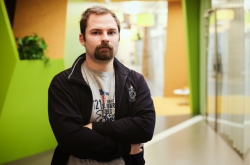The agile or traditional model — what is the market’s choice?
According to a forecast by the Gartner analytical agency, by 2017, expenses on IT worldwide will reach 3.5 trillion dollars, which is 2.7% higher than in 2016. By the end of the year, the market's estimated growth will be 4.2%. As before, the growth will be the result of investments in digital businesses, intellectual automation, optimization and innovations in services.
Yet, what is this optimization about, and how should companies organize their work under conditions of the growing market and increasing competition? Several years ago, experts from Gartner forecasted that by 2017, 75% of the world's IT-organizations will work in either of two ways: the traditional one, which relies on predictability, precision and stability, or the "research" one that focuses on flexibility and speed. The latter has to do with development of the so-called "agile" approaches to IT-projects. According to many companies, they allow complying with the changing market’s requirements — reduce risks and increase the development speed, thus decreasing the probability of a project's failure.
How does it work? Agile approaches relieve many risks thanks to a more active interaction between team members and customers. Two-week development intervals — the so-called "sprints" - make creating a product a lot easier, as it can be frequently reworked based on feedback as opposed to creating a final version after a long period of time. This way, the traditional "waterfall method", the development model that was once deemed ideal, gives way to the new, express approach.
So, how does it work on practice?
Many St. Petersburg IT companies are already working using agile approaches — for instance, Scrum and others, notes Maksim Ivanov. They imply a totally different approach to project management, and even different competencies that developers have to possess. Yet, recent graduates have the necessary skills?

"Last year, we organized round tables on soft skills for IT at ITMO University. There, we gathered representatives of several large companies from the IT market, and asked them whether they were OK with specialists that come work with them right after graduation. It turned out that they were satisfied with the level of knowledge the graduates possess; yet, there's a different problem. Most specialists on the IT market lack social skills and teamwork, whereas working on any project implies constant communication. We've used this reference to create the ITalented course, during which representatives of these companies will tell students of real tasks in the IT market", shares Anastasia Prichislenko, head of the Personal Development Center.
How will it all be organized?
The course will consist of seven workshops by representatives of St. Petersburg's major IT Companies. Each will be of its own, unique format.
"They will share about how to behave during job interviews, how to write a proper resume — all of that is pretty basic, but practice shows that even good specialists often make many mistakes. Everyone knows about interviews at Google — there are hundreds of articles on it. Yet, many programmers that have just graduated don't really understand how to approach a recruitment officer, and how to position themselves on the market", explains Maksim Ivanov.
For instance, the one to explain how to write a resume, successfully pass an interview and apply one's skill at an IT Company will be Alexei Chaikin, HR-director of the i-Free Company. Specialists from such companies as Digital Design, STM, Spearsoft and others will share on the daily work on different projects.

And what of real cases?
Apart from representatives of HR-departments, technical specialists will also share about their work. For example, Konstantin Sazonov, front-end developer and team lead of the TradingView Company, will show real examples on how can a student get experience of working with real projects, find a suitable company and progress.
"The seven sessions of the course are more than just lectures, they include a whole set of practical cases, upon completing which the students will understand how an IT company works and which technical means it uses. All of the lecturers are representatives of successful IT companies that have been working in St. Petersburg for a long time, each having its particularly strong competencies. Some use Scrum, some — other models, and each has its own well-established system. I just can't get it why all of this is not taught at universities. Anyhow, during this course, our lecturers will tell and show what everyday work on a project is like", underlines Maksim Ivanov.
Who will find the course useful?
Both Bachelor (starting with second year) and Master's students can take part in the course; if the former will get a chance to learn something new and get their first experience with real cases, the latter may well find new contacts and get more versed in present situation on the labor market.
What is more, such programs are of use to companies, as well; many large IT-Companies now even have special staffthat collaborate with universities and organize special educational projects.
"Such courses are a great way to build a mutually beneficial cooperation. Companies come to universities to meet their potential employees, and students can assess the condition on the labor market,explains Maksim Ivanov. Now, not only recruitment officers are scrupulous. Young specialists are becoming more and more picky, as well. Those who are now 18−20 and who will soon become highly qualified specialists working for high-technology corporations want more than just money. They are interested in their future work environment, as well as a corresponding level of tasks — the opportunity to take part in interesting projects. All of that significantly affects their approach to labor market".
The ITalent educational course, organized by ITMO's Personal Development Center, starts on April, 7th on Chaikovskogo, 11/2.






